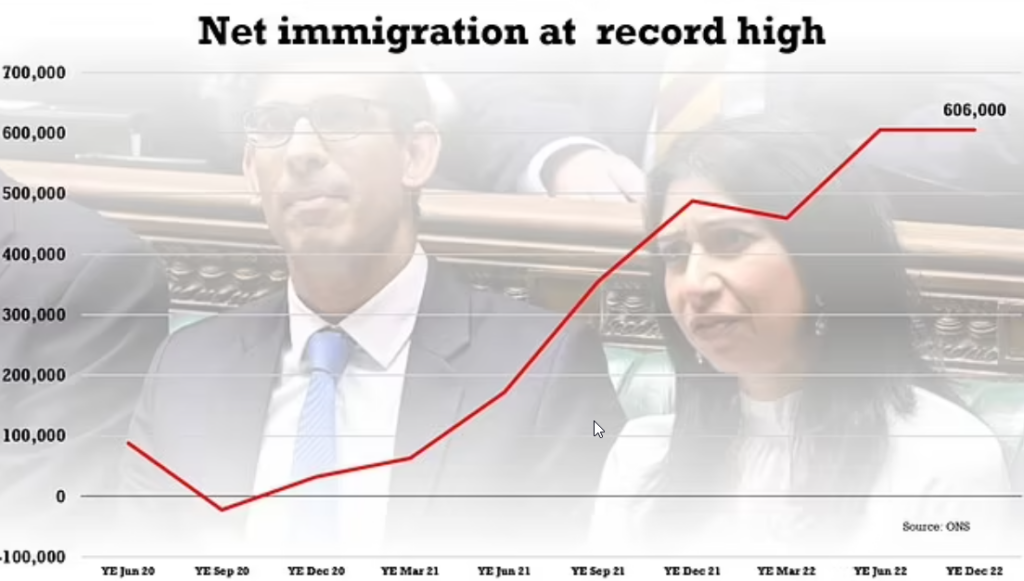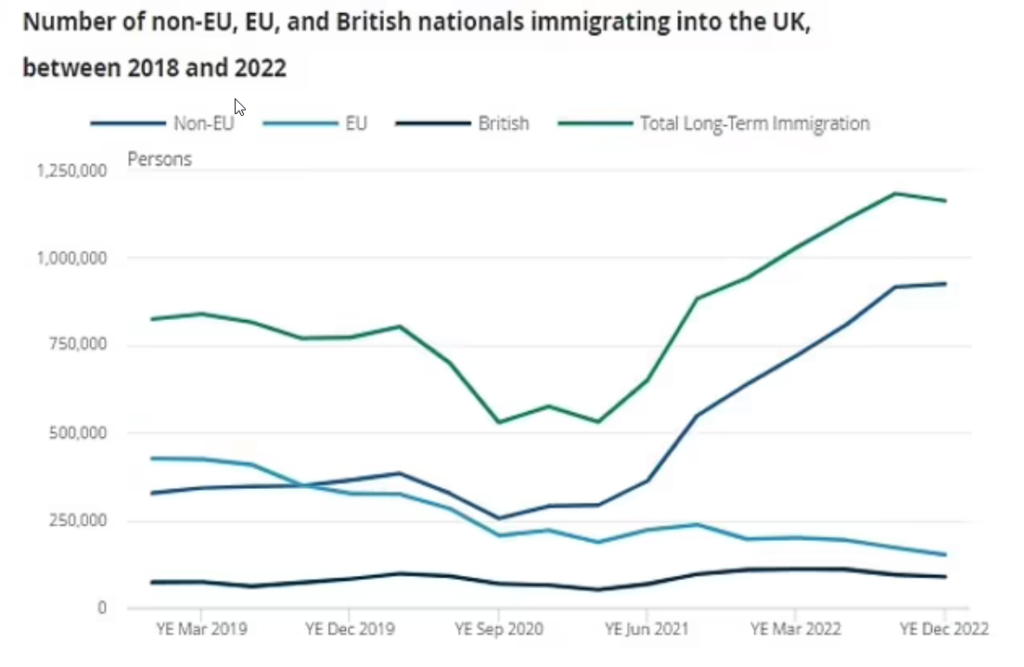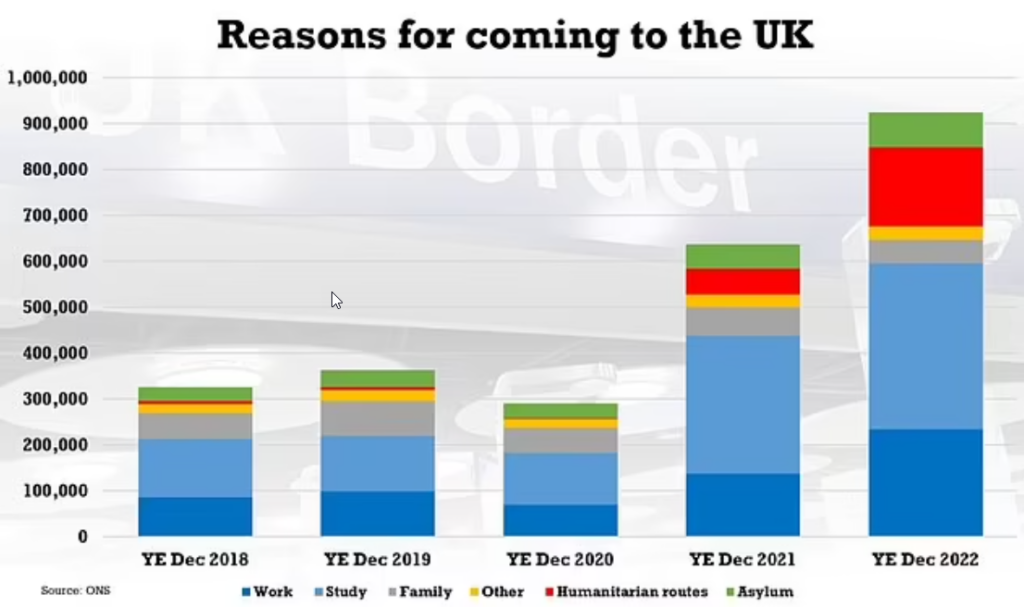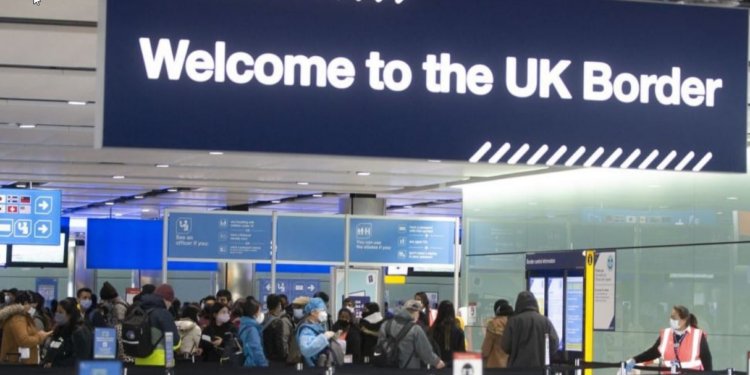Prime Minister Rishi Sunak admitted immigration is “too high” today as he faced a backlash over figures laying bare record numbers arriving in the country – 1.2 million total, 606,000 net in 2022, according to official figures released today. The Mail has more.
Long-awaited statistics showed net migration was 606,000 across 2022. That was far higher than the 488,000 level for 2021 – even though that was upgraded by 91,000 in the latest official publication.
The jump was fueled by arrivals from outside the EU, largely coming to study or work, as well as to seek refuge from chaos in Ukraine, Afghanistan and Hong Kong.
Although slightly lower than some had feared, the eye-watering level – roughly equivalent to adding the population of Bristol or Glasgow in a single year – sparked a furious political row over the Conservative manifesto pledge that “numbers will come down” from the 226,000 in 2019.
Under David Cameron and Theresa May there was a commitment to bring the long-term net migration figures into the tens of thousands, and one of the selling points for Brexit was ‘taking back control’ of borders.
Tory anger at the situation was evident in the House of Commons this morning, with warnings that voters will not tolerate the “unsustainable” situation.
Speaking on ITV’s This Morning, Mr. Sunak said: “Numbers are too high, it’s as simple as that. And I want to bring them down.”
But Mr. Sunak stressed he had “inherited” significant levels, suggesting he was still aiming for the 266,000 [sic] from the manifesto. Pressed on whether immigration is out of control, he replied: “Well, no, I think the numbers are just too high.”
The premier said measures put in place this week to stop most foreign students bringing dependants “are significant”.
In a glimmer of encouragement for Mr. Sunak, analysts at the Migration Observatory suggested that net migration might be on the way down, having peaked at 637,000 in the year to September.
Among other developments with a raft of government figures released today:
- Nearly one-and-a-half million visas were issued in the year to March 2023 to people coming to the U.K. for work, study or family reasons, or through one of the Government’s settlement schemes. Nearly 200,000 of those were to Ukrainians;
- For the first time asylum seekers were included in the immigration statistics, with 76,000 people applying in 2022, up from 53,000 in 2021;
- The backlog of asylum cases has hit a new peak since comparable records began in 2010, with 172,758 people waiting for an initial decision at the end of March, up 57% on the previous 12 months;
- Just 1% of Channel boats arrivals over the past year have had an initial decision on asylum applications;
- Home Office minister Robert Jenrick told the Commons that some universities are “in the immigration business” rather than teaching and education;
- Home Secretary Suella Braverman has been accused of “going to ground” after she dodged appearing in person to respond to the figures. Instead her allies have made clear she wants more drastic steps to curb numbers, and has faced resistance from Cabinet colleagues concerned about damaging the economy.
Will the Tories ever actually deliver on their longstanding manifesto pledge to reduce immigration to pre-Blair levels? Will voters ever trust them enough again to give them the chance?
Too many Tory ministers seem to be convinced mass immigration is necessary for economic growth. However, as Peter Lilley points out in the Telegraph: “Far from boosting growth, the highest level of immigration in our history has been accompanied by our slowest productivity growth on record”. Even the UN International Labour Office has, Lilley says, stated that immigration is no substitute for investing in the native workforce: “What may begin as a temporary shortage of trained native workers can be made more permanent by attempting a quick fix from migrant labour. Importing migrants into a sector whose employers are complaining of insufficient trained natives will exacerbate (rather than alleviate) its native shortage.”
Lilley notes that the NHS is propped up by foreign doctors and nurses, not because Brits don’t want to do the work, but because “we turn away tens of thousands of British applicants every year because training places are rationed. The NHS prefers to let poor countries do the training”.
More workers mean a bigger economy, Lilley agrees – but, crucially, “our standard of living only grows if productivity per head rises”, which can only come from more capital investment per head and improving skills. Yet, perversely, “mass immigration reduces the incentive to invest, acquire skills and offer training”.














To join in with the discussion please make a donation to The Daily Sceptic.
Profanity and abuse will be removed and may lead to a permanent ban.